The Long Road to Mfangano Island
- Aaron Schorr
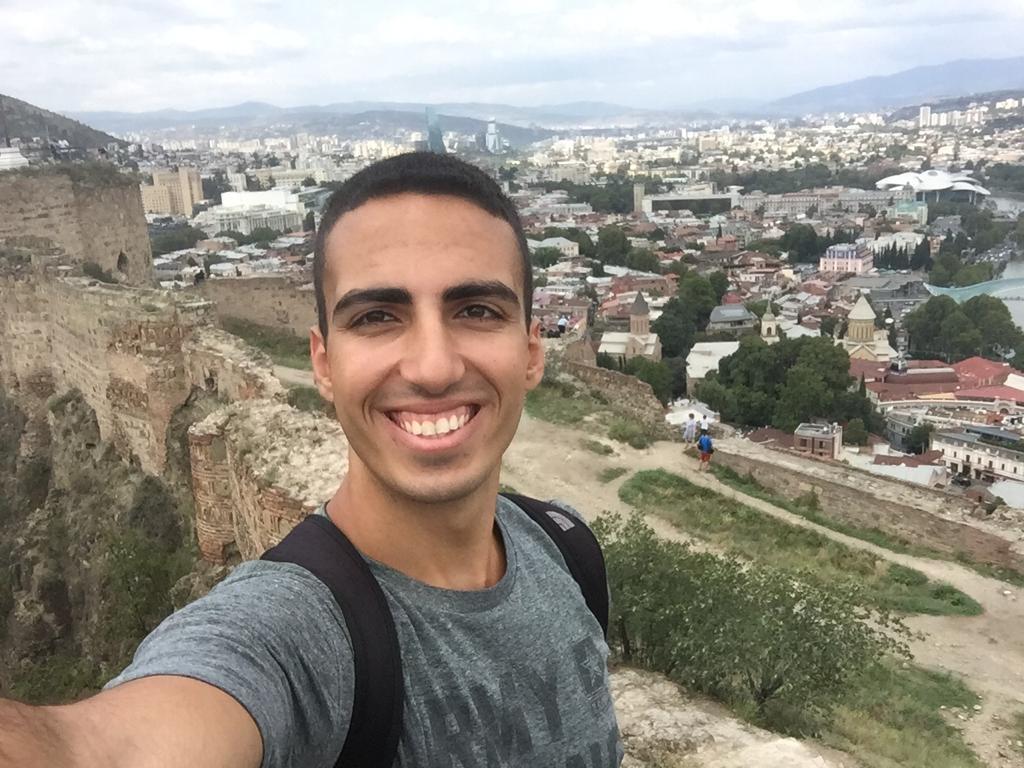
- Dec 14, 2019
- 11 min read
Updated: Dec 22, 2019
Most of us came back sick from Amsterdam. I had a low fever and a splitting headache, not enough to prevent me from heading to Kenya but enough to make me rather unhappy. And so, after 2 short rest days at home I found myself back at the airport to catch a flight to Kigali, Rwanda and then onwards to Nairobi, Kenya. The flight to Rwanda was nearly empty (for some reason RwandAir has 3 weekly flights to Tel Aviv) which helped me get some sleep, the captain was French and the rest of the Rwandan crew had mustaches, nearly to a man. I woke up somewhere over Uganda and had a look out the window. The map showed we were near some towns but the landscape below was nearly pitch black. What a stark contrast to Israel and Jordan, which had shone brightly beneath us; even Saudi Arabia had quite a few bright lights. We landed in Kigali just before sunrise and deplaned in a seemingly empty airport: there were hardly any vehicles present, the squat control tower looked deserted and the apron was empty apart from another Rwandan airliner and a 767 with the words "UNITED NATIONS" emblazoned on the fuselage in 3 foot high block letters. The whole scene was reminiscent of movies made about the Air France airliner that was kidnapped and landed in Entebbe, Uganda ('Operation Thunderbolt"), minus the armed soldiers everywhere. When I realized Entebbe was hardly 200 miles away that actually made a lot of sense. Welcome to Africa.
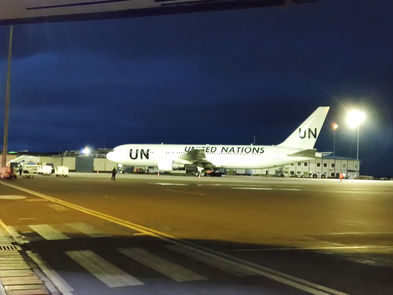
Nairobi - Ebola checks, street children and traffic
After several hours waiting I boarded the connecting flight to Nairobi, with wonderful views of green plains and lakes the whole way. The scene at Jomo Kenyatta airport was like in Kigali, but on a larger scale: about equal numbers of Kenyan airliners and UN/Red Cross aircraft, say 10 of each.
The first stop at the airport was the Ebola checkpoint. Each passenger had to have a questionnaire checked out by a public health official and their temperature taken by an infrared camera. I had had fever over the last few days and I was worried I wouldn't pass but luckily the display read 36° and I was admitted.
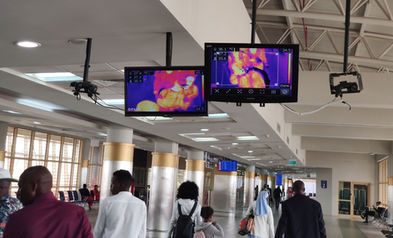
Google Maps had said there was a bus heading into town but when I asked some soldiers outside the airport where the bus stop was they seemed rather confused and pointed me in the opposite direction of what the app said. I walked to the bus stop's supposed location, refusing the many taxi offers along the way, and asked a man sitting there whether there was a bus to town from there, but he laughed and said "nobody takes the bus here. You can take a taxi, a matatu or a boda boda". I only knew what one of those words meant, so taxi it was. He immediately offered to drive me himself, we agreed on a price and set off. -10 savvy tourist points for this guy. Nairobi is notorious for its traffic and today was no exception. The 20 kilometers from the airport downtown took us an hour and a half of side street driving, including spontaneous stops for sugarcane (I passed for my stomach's sake) and tire inflation. My first impression of the city was chaos - drivers seemingly do whatever they feel, motorbikes weave between brightly colored vans and there are hardly any working traffic lights. When we finally came across a working one, my driver promptly proceeded to run a red light. I asked him if he wasn't worried about the police, to which he responded, "sometimes police try the best they can try but they can't manage". Wise words indeed.
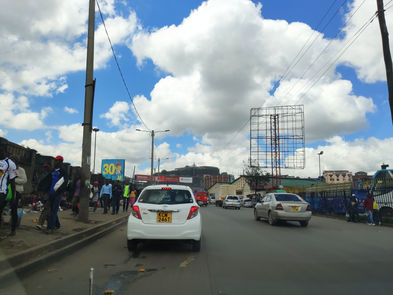
My first stop was the Nairobi Hilton, my rendezvous point with some local guides. I had booked a tour with a company called Nai Nami, which is run by former street children from the city's slums and promises to be a unique experience. My group of 3 tourists had 4 Kenyan guides - Mrembe, Kissmart, "Typhoon" and "Cheddaz" - all former street kids who now guide tourists through the less savory parts of Nairobi with plenty of colorful stories along the way. They gave us some do's and don'ts and we set off into the massive market that stretches south and east of the downtown. The 3 hour tour was eye opening, to say the very least. I spent most of it with Kissmart, who was born in Nairobi and ran away from home to escape his abusive father at age 5.5. He started off begging on the street and gradually progressed to more sophisticated methods of earning money: collecting scrap metal, pickpocketing and what he called the "shit bucket trick" - they would fill a bucket with human waste and demand money from passersby while threatening to dump the bucket on them. Most people, he said, paid right up.
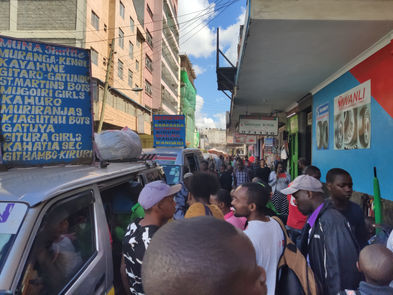
When the guides heard I was Israeli, they immediately wanted me to teach them Krav Maga. I told them my only experience was some very simple moves I had learned in basic training, which made me achieve instant celebrity status as an Israeli soldier. Typhoon told me he has "big respect" for soldiers since a policeman wanted to arrest him as a teenager for smoking pot until some soldiers showed up and threatened to beat the policeman up unless he let him go and Kissmart said the Israeli military is "well respected" in Kenya. Please don't let Bibi get word of this. I showed them a picture of me in uniform with a gun, which was even more incredible to them. "Everyone in the slums wants a gun", Typhoon said, "if I had one I would've been a millionaire or died a legend".
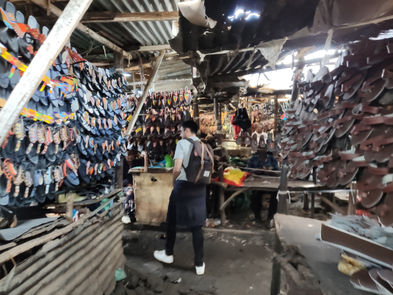
We walked past market stall after market stall, crossing over a muddy river where the street children wash their clothes and walking down a street which becomes a huge open-air mechanical shop during the day, with grease everywhere and naked truck engines running by the side of the road. Our guides were certainly quite well-known in these parts, seeing as we were greeted every few meters by someone they knew. There would be high-fives and fist bumps all around and we would continue on our way. Some people asked for money, but a few magic words in Swahili from the guides would have them smile and walk by. The tour ended at a restaurant serving local food (greens, lentil stew, and flatbread - my mother would be proud), which was good, despite me hardly having an appetite. The tour was an awesome experience, you should check them out at nai-nami.com, even if you have no plans to make it to Nairobi.
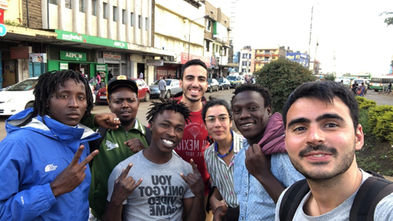
The guys asked me where I was staying and said the best way to get there was a boda boda. I still didn't know what that was, but I saw it was an option on Uber so it seemed legit, even if it was cheaper than a normal Uber. A few minutes later, a motorbike pulled up and the driver handed me a reflective vest and a helmet. So this was the famous boda boda. 20 terrifying minutes later (and let me remind you that I ride motorcycles back home) we pulled up at the hostel, after squeezing through gaps in traffic mere inches wider than the motorbike.
I was feeling rather deadbeat after checking in and wanted nothing more than to crawl into bed, but I really needed a Kenyan SIM card and I figured my odds of success in Nairobi were much better than in the countryside. To my luck, one of the hostel employees also needed to visit the telecom shop so I headed out with him. "How far is the shop from here?" "Not far." "Kenyan not far or actually not far?" He chuckled; the walk turned out to be half an hour. Earlier in the day, Mrembe had said the best method of getting around Nairobi was the "Kenyan leg-cycle", and he wasn't talking about a bike. Kenyans, the world's marathon champions time and again, really don't seem to mind walking, especially when the alternative is sitting in standstill traffic or catching a boda boda, which are cheap for tourists but too expensive for the locals to rely on. Those who don't want to walk take brightly colored vans with every imaginable design painted on the sides - from European sports teams liveries, through corporation logos, to images of the Pope, Ice Cube, Barack Obama (a local hero since his grandfather grew up in a Nairobi slum) and others.
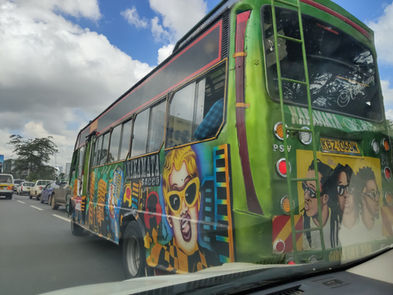
With my SIM needs sorted, I needed to make it back to the hostel. Traffic was a solid jam the whole way and I really didn't fancy making the return trip uphill on foot, so boda boda it was. 5 leg-numbing minutes and 120 Kenyan shillings ($1.20) brought me back, my head feeling like it was about to burst after inhaling diesel fumes the whole way.
There were two shower stalls in the hostel; one had a broken faucet and the other barely locked. When I finally managed to shut the door, the hot water, which the proprietor had promised was "instant", refused to make an appearance unless I turned the pressure way down. My fever was back and I preferred a lukewarm trickle to a frigid deluge, but I was mighty unhappy.
The last item of business was to try and contact the driver who was supposed to take me to Lake Victoria the next morning. My guides from the afternoon had agreed on a price with him and sent me his number, but the guy couldn't speak a word of English when I tried calling and all I could get out of him was that I should meet him at 7. Google Translate-ed text messages in Swahili saw no response. I vaguely remembered where we had seen him during the tour and hoped I would be able to find him the next morning.
The Longest Drive
My alarm rang at 6 am after 10 hours of tossing and turning but my fever was gone. A taxi (four-wheeled this time) brought me downtown and by some miracle I remembered the exact street corner in an area known as OTC where the van was loading up with passengers heading to their villages for the Christian holidays. The dispatcher said the ride would be about 7 hours and the fare was 1200 shillings ($12). A shared van in Kenya, as it turns out, is called a matatu, thus forming the final piece of that particular puzzle.
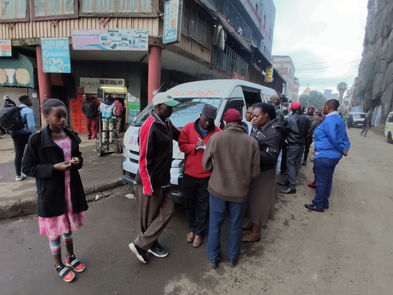
The ride was one of the most excruciating in my life. Seven hours magically turned into nine with innumerable breaks for bathrooms, police checkpoints, tire pumping or no apparent reason at all, with a background soundtrack of the driver either incessantly honking at motorbikes and trucks or literally screaming into his phone, sometimes both at the same time. The road conditions for the first hour and a half out of Nairobi varied between bad and appalling, with the pavement never lasting for more than a kilometer before reaching one of countless "construction zones", only about half of which showed any signs of construction, which generally meant making a detour through an unimproved road or a dirt track.
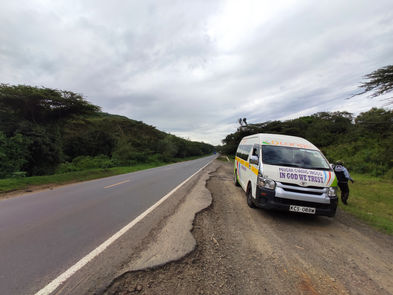
The construction abruptly stopped and we found ourselves at the top of a mountain pass. Below us was the Great Rift Valley, a vast, open expanse of green where most tourists to Kenya go for safari. When we finally made it into the valley after the mother of all detours on a dirt "road", conditions improved dramatically and I managed to catch some sleep. We drove through countless roadside markets and villages, even spotting a herd of zebras (definitely the wrong term but bear with me here) by the side of the road. Many hours later we climbed into the mountains in Kisii County on the other side of the valley, where the pavement became intermittent once again and the rain turned everything to mud.
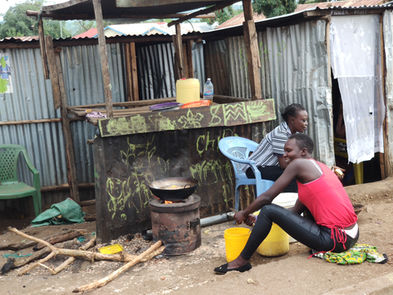
Some anecdotal events from the ride include:
Mechanical trouble, to which the apparent solution was occasional stops to thump the dashboard,
Roadside vendors attempting to sell us anything from sacks of beans to grilled corn on the cob (Kenyans call it maize) to a live rooster,
A pickup truck driving in the rain with at least 8 singing men in the bed,
The driver barreling down one of the few decent stretches of road with his head out the window for a good 60 seconds.
All in a day's work in Kenya.
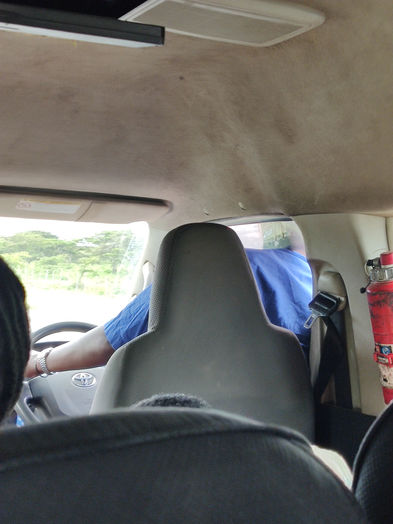
I made an unplanned change of vehicle in the crossroads town of Rody Kopany. The honking only intensified, but at least there was African music playing to drown some of it out and I got to sit up front. One of the passengers must've really liked the fresh air, since he spent a decent part of the ride leaning out the side door of the van. The other passengers took to calling me "Odiero", which they claimed means "smart brown person". I'll have to check up on that one.
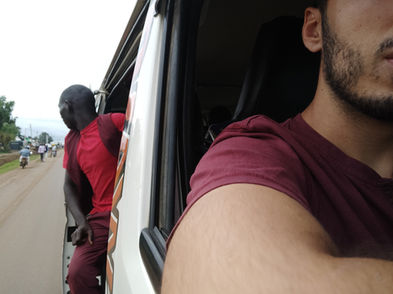
A final matatu change in the town of Homa Bay brought me to the lakeside town of Mbita, with two men hanging out the side of the van this time until one hopped out into a car; the other turned out to be the "conductor". The landscape rose all around us as we skirted the edge of Lake Victoria, with jagged hilltops and steep islands becoming visible.
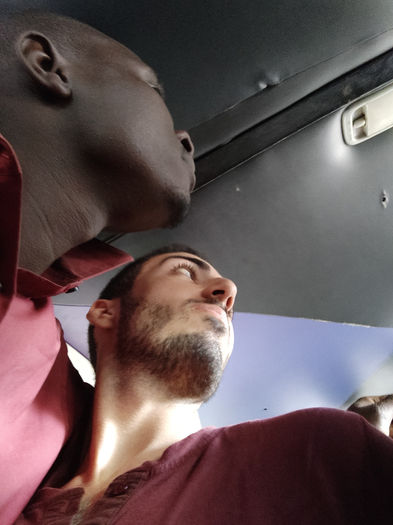
After 11 hours in matatus, I finally made it to Mbita, where I was supposed to meet Samuel, the organizer of my volunteering project, and take the ferry with him to Mfangano Island, 10 miles offshore in the lake. The ride to Mbita had taken so long, however, that by the time I made it there the last ferry for the day had already departed and Samuel gave me the name of a place to stay.
I paid 500 shillings ($5) for a private room with its own shower and toilet, which seemed too good to be true. Surprisingly enough, it was. The sun was setting as I arrived at the guesthouse so I headed down to the shore of the lake, where the spectacular sunset nearly justified the long ride. Back in my room, I wanted to use the bathroom. No flush. I tried turning the shower faucet. No luck there, either. I asked one of the employees and discovered there was no running water "at the moment". My shower tonight would have to come out of a bucket. It wasn't my first time showering out of a bucket (flashback to a cab driver's house in Georgia last summer, a story for a different time) and the cool water was refreshing in the equatorial air.
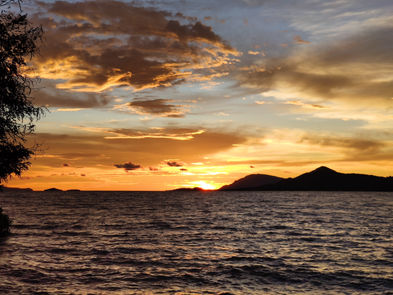
Water buses and overloaded motorbikes
The next morning I met Samuel and joined him for some shopping in Mbita's lively market, which looked a lot like the way Afghanistan is portrayed in movies to me. I picked up a pair of rubber boots, which I hope will help me combat the all-encompassing mud I was sure to find on the island.
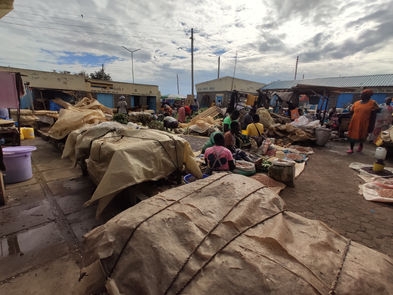
We missed the water bus by literally a minute and used the wait to have some breakfast near the water. I would call it a dock, but there wasn't really any dock to speak of, just a slightly flatter sandy area where the boats load and unload passengers. We were in a prime spot for people-watching, with people getting off the water bus and on to motorbikes and vice versa, including a Kenyan soldier who boarded a motorbike with another passenger (besides the driver) while holding his strapless rifle in a vertical position beside him.
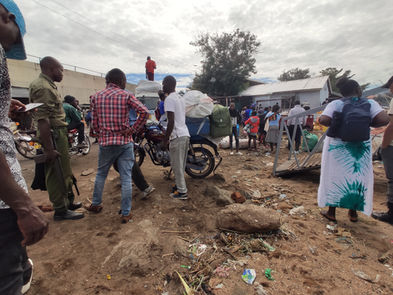
The prize for "most absurdly overloaded motorbike", though, undoubtedly goes to a family of 2 parents, 2 children and a baby all getting off the same motorbike, the father carrying a knapsack as well. I was astonished. Who needs a car when your whole family fits on two wheels?
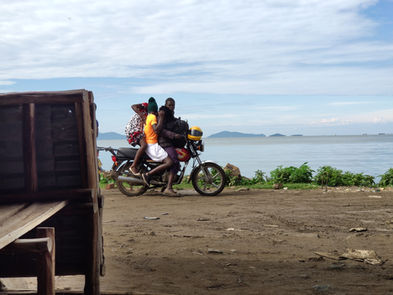
Curiously, just behind us was a completely normative bridge linking Mbita with nearby Rusinga Island, a stone's throw away from the mainland. The bridge was the first modern and functional piece of infrastructure I had seen in Kenya, looking like it was cut and pasted right out of the American East Coast, concrete pylons, steel trusses and all. It must have cost more than the whole town's GDP to construct but it was a promising sight.
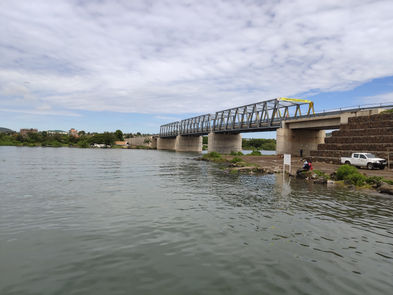
The water bus took ages to depart but at this point I wasn't surprised anymore. When we did get out on the water, though, the views were magnificent. We cruised by lush volcanic islands, the sun reflecting off the smooth water as we passed small fishing boats, out in pursuit of the day's catch. It was a white person's fantasy of paradise, if paradise were a developing country with no safety standards.
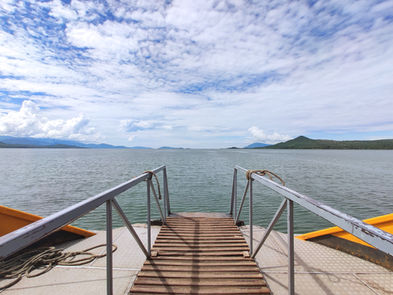
My destination slowly took form out of the haze, steep and majestic, as we came in to dock. The vessel came to a stop, a gangway was lowered, and thus, at noon sharp on Friday, I landed on Mfangano Island, Kenya, nearly 62 hours after leaving home Tuesday evening.
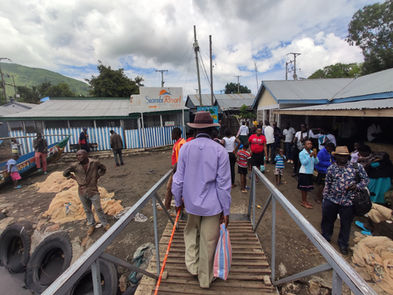





I think Mom's old calendar code would distinguish between dschorr and Dschorr. Great stories and photos Aaron!
I certainly can't imagine any Westerner coming here and not thinking it's crazy! I promise to share stories when I return.
Whoops, it can be confusing.
dschorr is your father
Wow - it sounds crazy (which Africa feels to all first world people I think) and amazing! I cant wait to hear more! Have fun